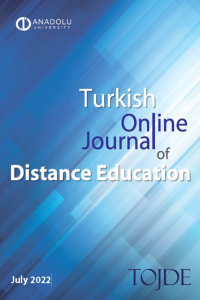Abstract
References
- Almekhlafy, S. S. (2020). Online learning of English language courses via blackboard at Saudi universities in the era of COVID-19: perception and use. Emerald Insight, 5(1).
- Alsuhaibani, Z. (2021). Saudi EFL students’ use and perceptions of Blackboard before and during online learning amid COVID-19. Arab World English Journal. Special Issue on CALL. 22-37.
- Alzamil, A. (2021). Teaching English speaking online versus face-to-face: Saudi students’ experience during the COVID-19 pandemic. Arab World English Journal, 12(1), 19-27.
- Banditvilai, Choosri. (2016). Enhancing students’ language skills through blended learning. The Electronic Journal of E-Learning, 14(3), 220-229.
- Bin Dahmash, N. (2020). ‘I Couldn’t Join the Session’: Benefits and challenges of blended learning amid COVID-19 from EFL students. International Journal of English Linguistics, 10(5).
- Bryson, C., & Hand, L. (2007). The role of engagement in inspiring teaching and learning. Innovations in Education and Teaching International, 44(4), 349-362.
- Daniel, S. J. (2020). Education and the COVID‐19 pandemic. Prospects, 49, 91–96.
- Girik Allo, M. D. (2020). Is the online learning good in the midst of Covid-19 pandemic? The case of EFL learners. Journal Sinestesia, 10(1), 1–10.
- Han, Y. & Hyland, F. (2015). Exploring learner engagement with written corrective feedback in a Chinese tertiary EFL classroom. Journal of Second Language Writing. 30, 31–44.
Abstract
COVID-19 has dramatically changed the process of teaching, as educational institutions replaced in-person teaching with online teaching to ensure educational continuity while managing the spread of the contagious disease. Drawing on the multifaceted concept of engagement, engagement is addressed as a sole construct. The present study adapted Student Course Engagement Questionnaire (SCEQ) to explore the impact of online teaching through Blackboard on English as foreign language (EFL) college students’ engagement in writing. The study sample included 148 students. The results of the present non-experimental study generally indicated that online learning through Blackboard positively influenced the engagement of Saudi EFL learners. However, it is essential to note that the students showed a high level of engagement in terms of skills engagement. In contrast, the levels of engagement were moderate for the other three elements of engagement: Emotional, participation/interaction, and performance. The findings also demonstrated that the students perceived the learning experience positively. The participants valued the various virtues offered by online learning platforms, specifically Blackboard. Consequently, it is recommended that using Blackboard features such as blogs, breakout groups, and videoconferencing will help foster educational practices locally and internationally.
Keywords
COVID-19 EFL Learners Course Engagement Online Learning Student Course Engagement Questionnaire EFL Writing
References
- Almekhlafy, S. S. (2020). Online learning of English language courses via blackboard at Saudi universities in the era of COVID-19: perception and use. Emerald Insight, 5(1).
- Alsuhaibani, Z. (2021). Saudi EFL students’ use and perceptions of Blackboard before and during online learning amid COVID-19. Arab World English Journal. Special Issue on CALL. 22-37.
- Alzamil, A. (2021). Teaching English speaking online versus face-to-face: Saudi students’ experience during the COVID-19 pandemic. Arab World English Journal, 12(1), 19-27.
- Banditvilai, Choosri. (2016). Enhancing students’ language skills through blended learning. The Electronic Journal of E-Learning, 14(3), 220-229.
- Bin Dahmash, N. (2020). ‘I Couldn’t Join the Session’: Benefits and challenges of blended learning amid COVID-19 from EFL students. International Journal of English Linguistics, 10(5).
- Bryson, C., & Hand, L. (2007). The role of engagement in inspiring teaching and learning. Innovations in Education and Teaching International, 44(4), 349-362.
- Daniel, S. J. (2020). Education and the COVID‐19 pandemic. Prospects, 49, 91–96.
- Girik Allo, M. D. (2020). Is the online learning good in the midst of Covid-19 pandemic? The case of EFL learners. Journal Sinestesia, 10(1), 1–10.
- Han, Y. & Hyland, F. (2015). Exploring learner engagement with written corrective feedback in a Chinese tertiary EFL classroom. Journal of Second Language Writing. 30, 31–44.
Details
| Primary Language | English |
|---|---|
| Journal Section | Articles |
| Authors | |
| Publication Date | July 1, 2022 |
| Submission Date | November 4, 2021 |
| Published in Issue | Year 2022 Volume: 23 Issue: 3 |


